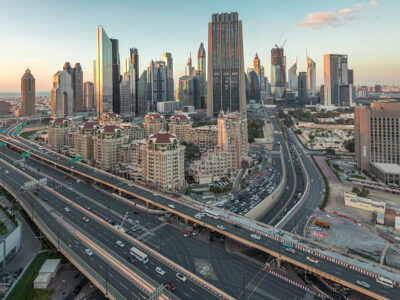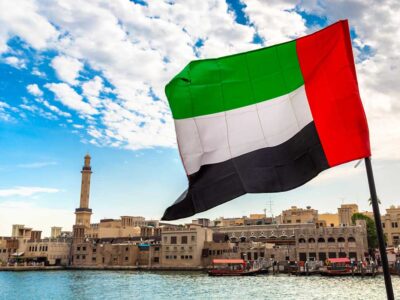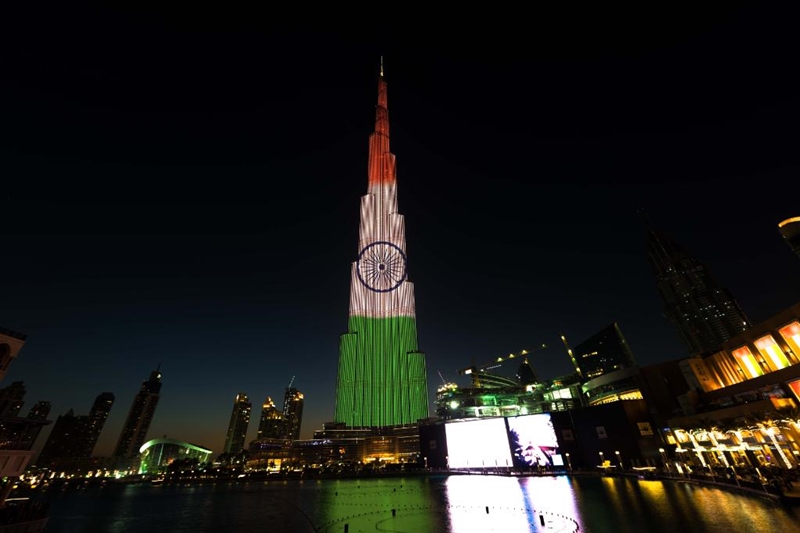On Saturday, UAE ministers and senior officials from the country stressed the importance of the new Comprehensive Economic Partnership Agreement (CEPA) signed between the UAE and India on Friday.
The deal aims at increasing bilateral non-oil trade between the two countries to $100bn over the next five years. It is also the first signed under the UAE’s international agreements development programme, which was launched as part of the Projects of 50.
“The UAE-India CEPA is a historic milestone in our bold plans to build an attractive, competitive, resilient, sustainable and knowledge-driven economy for the next 50 years. It will increase non-oil bilateral trade by more than $100 billion and create enormous benefits for people in both countries. It is also more than an economic partnership; it is a testament to our deep, fraternal and strategically important relationship with India, one built on decades of close cooperation across everything from investment and innovation to energy and the environment. It represents a new era of progress, prosperity and opportunity for our nation,” Abdulla bin Touq Al Marri, UAE Minister of Economy said in a statement.
Non-oil trade prior to the pandemic between the two countries reached around $40bn. The UAE is India’s third largest trading partner and accounts for approximately 40 percent of its trade with the Arab world.
Dr Ahmad Belhoul Al Falasi, UAE Minister of State for Entrepreneurship and SMEs said: “The Comprehensive Economic Partnership Agreement between the UAE and India will unleash the spirit of entrepreneurship that exists in both countries, inspiring new innovators and investors. Small businesses and startups from Mumbai to Abu Dhabi will benefit from the enormous trade, investment and economic opportunities this deal will deliver.”
“Companies and especially SMEs will find it easier to expand globally with enhanced access to new customers, networks, avenues of collaboration and mechanisms to scale at speed. We simply could not strike the first bilateral trade agreement in our nation’s history without ensuring their needs were met. One a broader scale, this deal will cement the UAE’s position as an economic hub, catalysing the economic diversification and sustainable growth agenda of the country, and expanding the presence of UAE companies and trade in global markets, while increasing exports and attracting qualitative investment, in line with our ambitions for the next 50 years,” he added.
Meanwhile, Dr Thani bin Ahmed Al Zeyoudi, UAE Minister of State for Foreign Trade explained that the CEPA between the two countries is a reflection of the UAE’s vision to use trade and investment as the key drivers of sustainable economic growth.
“It will enhance ties in key economic sectors, boost exports, encourage foreign direct investments, attract skilled talent and create huge opportunities for companies in both countries. India is one of our oldest trading partners. We are keen to build stronger, deeper economic relations in line with our preparations for the next 50 years of growth and prosperity, as well as accelerating a global post-pandemic recovery. I would like to thank the negotiating teams from UAE and India who worked tirelessly together to achieve this historic agreement that will have a positive impact on sustainable growth in both economies,” he said.
Mohamed bin Hadi Al Hussaini, Minister of State for Financial Affairs said: “The UAE-India CEPA demonstrates not only the strength of strategic ties between two great nations, but what can be achieved when negotiations are approached in the spirit of cooperation and mutual respect. As part of our efforts to strengthen the UAE’s position as a global centre for business, finance, investment and innovation, this agreement will improve access to one of the world’s fastest-growing markets. It will enable the financial and professional services industries in both nations to work more closely together, promoting both domestic and foreign direct investment. It is the culmination of dedicated, diligent and competent work to secure a balanced and mutually beneficial deal that will advance our progress.”
Suhail bin Muhammad Faraj Faris Al Mazrouei, Minister of Energy and Infrastructure said that the economic partnership demonstrates the “strong and historic commercial and economic” relationship between India and the UAE.
“India is considered one of the main partners of the UAE in both energy and oil sectors, and this historical agreement will open new horizons for companies operating in this field from the two countries. Also, the agreement will allow business councils in both countries, to jointly explore new growth and prosperity opportunities, especially in energy and infrastructure sectors,” he added.
Al Mazrouei added that the cooperation between the two countries has turned into a partnership that supports trade and the energy sector, including precious metals, chemicals and petroleum derivatives. In addition, the minister highlighted the important role that the UAE plays in global trade due to the country’s enhanced infrastructure and strategic location connecting the Middle East region and South Asia.
Dr. Sultan bin Ahmad Sultan Al Jaber, Minister of Industry and Advanced Technology likewise noted the agreement as a reflection of the strong and historical ties between the two countries.
Al Jaber said: “The economic partnership comes in line with the national strategy for industry and advanced technology adopted by the wise leadership of the UAE as the biggest and most comprehensive plan to develop the industrial sector in the country and enhance its contribution to stimulating the national economy. This partnership holds promising opportunities, based on the huge potential of India, which made it the fourth largest market in the world.”
“The new agreement between UAE and India, aims at enhancing partnerships in industrial fields, and supports innovation, in addition to providing more job opportunities. The two parties intend to expand strategic cooperation and start a new era focusing on increasing bilateral trade’ volume, improving mutual access to markets, and enhancing economic, industrial and investment opportunities,” the minister explained.
Mariam bint Mohammed Almheiri, Minister of Climate Change and Environment said: “The UAE is committed to creating a more sustainable world and a better future for humanity. This agreement marks a new era of cooperation between the two countries in the energy security sector and food security sector. The cooperation will also include agriculture, preserving natural resources and exchanging expertise to develop more robust agriculture and food systems in the face of climate change.”
Almheiri added: “The Agreement comes in line with our national efforts including hosting COP 28 in 2023 as part of ongoing efforts to work with countries around the world to develop new climate-friendly industries that reduce carbon emissions and deliver a qualitative shift in agriculture, food and water security.”
Sarah Al Amiri, Minister of Advanced Technology said: “This landmark agreement will boost economic productivity across the United Arab Emirates and India stimulating advanced technologies and future industries. Our industrial success will be built on the integration of the tools and technologies of the Fourth Industrial Revolution, and partnerships with similarly forward-looking countries are an essential part of this process.
“Over the last two decades, India has forged ahead with research and development in key sectors such as ICT, healthcare and space sciences, and we see a huge number of synergies with our emerging companies, institutions and start-ups in these fields. This Agreement will open new horizons for investors and contribute to our aim of doubling the industrial sector’s GDP contribution to AED300bn, creating hundreds of thousands of new jobs.”
Omar bin Sultan Al Olama, Minister of State for Artificial Intelligence, Digital Economy and Remote Work Applications said: “The Comprehensive Economic Partnership Agreement between the UAE and India establishes a new era of digital innovation for both countries. It represents a platform for unprecedented partnerships and cooperation in various fields including technology, artificial intelligence and the Fourth Industrial Revolution. The signing of this historic agreement reflects the continuing commitment of the leadership in the UAE and India to stimulate growth in the digital economy within the framework of a clear and strategic vision for the future.”
Ahmed Ali Al Sayegh, Minister of State said: “The Comprehensive Economic Partnership Agreement between the UAE and India is the first of its kind agreement signed under the Projects of the 50 initiative. It reflects the strength and depth of our ties with India, one of our oldest and most important partners. It is a further demonstration of the close and special relationship we enjoy, one that is gaining new momentum thanks to the shared ambitions of leadership in both countries. This agreement will stimulate growth in strategic industries, including the financial technology and the digital economy. It will also provide new opportunities for a vibrant, diversified, inclusive and sustainable economy.”
Khalid Muhammad Balama, Governor of the UAE Central Bank, said: “The Comprehensive Economic Partnership Agreement with India is a major milestone in achieving the UAE’s forward-looking vision for the next 50 years, providing a platform for bilateral trade, investment and contributes to creating opportunities for joint ventures in prominent fields such as financial services. The Central Bank of the UAE seeks to benefit from financial cooperation with India to continuously enhance the partnership between the UAE and India, based on the agreement we signed earlier. This promotes financial cooperation, trade exchange and economic partnership, and thus creating a vital and competitive national economy.
Ali Saeed Al Neyadi, Chairman of the Federal Customs Authority said: “India is one of our largest trading partners and a major destination for some of our most strategic exports, such as petroleum, precious metals, minerals, chemicals and more. The Comprehensive Economic Partnership Agreement represents a qualitative shift in our strategic relationship. It will increase the flow of goods and services in both directions by reducing or eliminating tariffs on more than 80 percent of goods. This is a win-win agreement that is complimentary and synergistic; it offers new and improved ways for both countries to cooperate on a broad range of issues. Our approach was to ensure better market access for both countries and negotiations took place with that goal in mind.”
Abdullah Al Basti, Secretary-General of the Executive Council of the Emirate of Dubai: “The UAE and India had established strong trade ties; these close ties have taken a major step forward today. The economic agreement builds on the UAE role as a global hub and a gateway to Africa, Asia and Europe. Our world-class infrastructure will make it possible for businesses in Dubai and the UAE to find new partners and customers in a market with more than one billion people. As our nation charts a path towards the next 50 years, this deal will enhance cross-border innovation by creating a digital framework for India and the UAE to leverage emerging and future technologies.”
Khaldoon Khalifa Al Mubarak, Member of the Executive Council of the Emirate of Abu Dhabi and Chairman of the Abu Dhabi Executive Affairs Authority said: “The UAE-India Comprehensive Economic Partnership Agreement (CEPA) represents a significant achievement in the longstanding relations between the two countries. As one of the biggest economies in the world, and one of the UAE’s top trading partners over the past years, India represents a market with opportunity, particularly in the fields of advanced technology, manufacturing, infrastructure, retail, and food production and distribution. The UAE, on the other side, provides significant commercial scope, driven by its dynamic and friendly business environment, logistic capability, advanced infrastructure and accessibility to the Middle East and Africa. We look forward to exploring areas of mutual benefit, accelerating bilateral trade and partnering on world-leading projects and innovations.”





